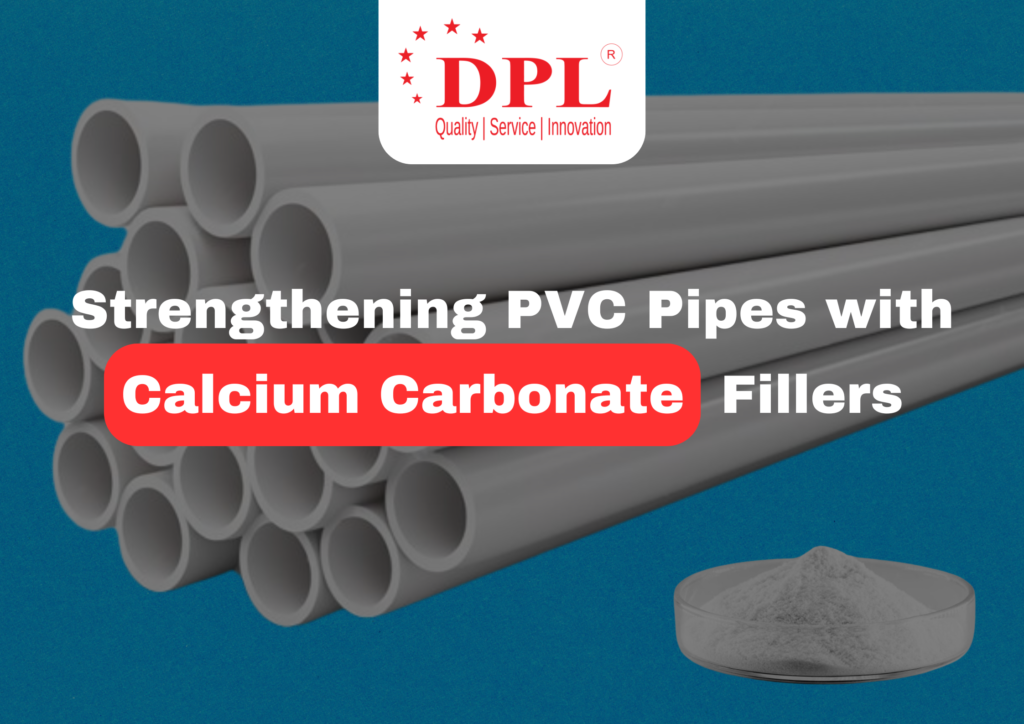
PVC or polyvinyl chloride, is a common plastic used in a wide range of products, from toys and packaging to pipes and construction materials. One of the most popular uses of PVC is in piping systems, where its durability, resistance to corrosion and ease of installation make it an ideal material. However, like all materials, there’s always room for improvement and that’s where calcium carbonate fillers come into play.
What Are Calcium Carbonate Fillers?
Calcium carbonate is a naturally occurring mineral found in rocks, primarily limestone. It’s commonly used in a variety of industries, including construction, pharmaceuticals and plastics.
When used in PVC pipes, calcium carbonate acts as a filler—a substance added to the material to enhance its properties. Fillers like calcium carbonate not only reduce production costs but also improve the strength and performance of the PVC pipes.
How Calcium Carbonate Strengthens PVC Pipes
Increased Stiffness and Strength
One of the main benefits of adding calcium carbonate to PVC is the significant increase in the material’s stiffness and strength. When calcium carbonate particles are mixed into the PVC matrix, they create a more rigid structure.
This makes the pipes less likely to bend or deform under pressure, which is particularly important in applications where the pipes need to withstand heavy loads or high water pressure.
Improved Impact Resistance
Impact resistance is another crucial property for PVC pipes, especially in environments where they might be subject to sudden forces, such as during installation or due to external impacts.
The addition of calcium carbonate helps to distribute these forces more evenly across the pipe’s surface, reducing the likelihood of cracks or breaks. This makes the pipes more durable and extends their lifespan.
Enhanced Thermal Stability
PVC pipes are often exposed to varying temperatures, from the heat of the sun to the cold of underground installations. Calcium carbonate improves the thermal stability of PVC, meaning the pipes are less likely to expand, contract or warp in response to temperature changes. This stability is vital for maintaining the integrity of the piping system over time.
Cost-Effectiveness
From a manufacturing perspective, calcium carbonate fillers are relatively inexpensive. By partially replacing the PVC resin with calcium carbonate, manufacturers can reduce production costs without compromising the quality of the final product.
The cost-effectiveness is passed on to consumers, making PVC pipes with calcium carbonate fillers a more affordable option for a wide range of applications.
Environmental Benefits
Beyond the performance and cost advantages, using calcium carbonate fillers in PVC pipes also has environmental benefits. The production of pure PVC resin requires significant amounts of energy and resources.
By incorporating calcium carbonate, the amount of PVC resin needed is reduced, leading to lower energy consumption and a smaller carbon footprint during manufacturing. Additionally, calcium carbonate is a non-toxic, naturally occurring material, which makes the resulting PVC pipes safer for the environment.
Applications of PVC Pipes with Calcium Carbonate Fillers
Thanks to their enhanced properties, PVC pipes with calcium carbonate fillers are suitable for a variety of applications:
- Water Distribution Systems: The increased strength and impact resistance make these pipes ideal for transporting water, whether for residential, commercial or agricultural use. They can handle the pressure of water flow and the weight of the surrounding earth without compromising their integrity.
- Sewage and Drainage Systems: In sewage and drainage applications, pipes need to be tough and durable to handle the constant flow of waste and the harsh conditions underground. The added stiffness and thermal stability provided by calcium carbonate fillers ensure that these pipes can perform reliably over long periods.
- Industrial Piping: Industries that require piping for chemicals, gases or other fluids can benefit from the enhanced properties of PVC pipes with calcium carbonate fillers. These pipes can withstand high pressures and temperatures, making them suitable for various industrial processes.
- Construction and Infrastructure: In construction, PVC pipes are often used for electrical conduits, plumbing and structural applications. The improved performance of pipes with calcium carbonate fillers ensures that they can meet the demands of modern infrastructure projects, providing a reliable and long-lasting solution.
Final Thoughts: A Smart Choice for Modern Piping
Incorporating calcium carbonate fillers into PVC pipes is a simple yet effective way to enhance their properties and make them more suitable for a wide range of applications. The increased strength, impact resistance and thermal stability, coupled with the cost-effectiveness and environmental benefits, make these pipes an excellent choice for both manufacturers and consumers.
As industries continue to seek out materials that offer better performance and sustainability, PVC pipes with calcium carbonate fillers are likely to become even more prevalent in the market. Whether for water distribution, sewage systems or industrial applications, these pipes offer a smart, reliable and economical solution for modern piping needs.
